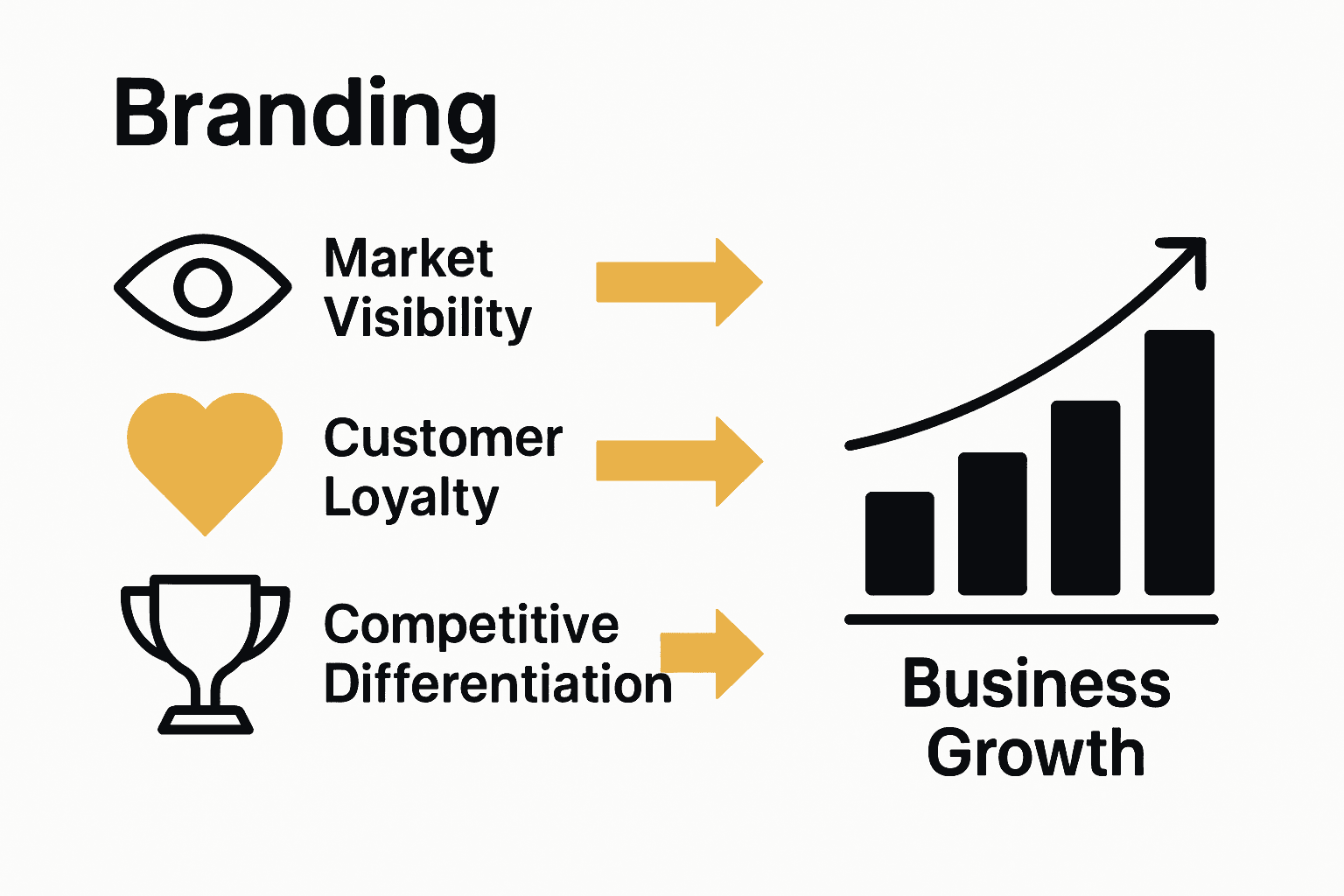What Is Rebranding and Why It Matters

Why invest in branding? This comprehensive guide covers brand fundamentals, ROI, risks, long-term impacts, and strategies for entrepreneurs and businesses.

Over 80 percent of consumers say the strength of a brand influences their purchasing decisions. In business, branding shapes how people remember and trust your company. A powerful brand is more than a logo; it defines your story and sets you apart from competitors. Understanding the real value of branding positions your business to build loyalty, attract the right customers, and achieve long-term growth.
Branding is more than just a logo or color scheme—it’s the strategic heartbeat of your business identity. At its core, branding represents the comprehensive narrative that communicates who you are, what you stand for, and why customers should choose you over competitors. Think of it as your business’s unique personality, expressed through visual, verbal, and emotional touchpoints.
A well-crafted brand identity serves as the foundational architecture of your business communication. Understanding what makes a business brand involves recognizing how various elements work together to create a cohesive image. These elements typically include:
The research highlights that organizational values play a critical role in defining brand distinctiveness. As Urde (2003) explains, these values are not just abstract concepts but concrete representations of a company’s operational philosophy. They function as internal guidelines that generate a unique organizational identity, helping to articulate what makes your business special.
Ultimately, effective branding transforms your business from a mere service or product provider into a meaningful experience. It’s about creating an emotional connection that resonates with your target audience, building trust, and establishing a memorable presence in a crowded marketplace. Your brand becomes the lens through which customers perceive and interact with your business—making strategic branding an investment in long-term success and differentiation.
Small businesses have unique branding challenges and opportunities that require strategic and innovative approaches. Branding for smaller enterprises isn’t about competing with corporate giants, but about creating authentic, memorable connections with your target audience. Learn more about brand positioning strategies that can help differentiate your business in a crowded marketplace.
Research highlights several key branding approaches that small businesses can leverage:
Small businesses often adopt innovative strategies to build their brand presence. According to research, they concentrate on finding compelling product offerings, creating limited but powerful brand associations, and providing direct product or service experiences. Digital communication becomes a critical tool, with businesses leveraging word-of-mouth marketing and creating organic buzz around their offerings.
The most successful small business brands understand that branding goes beyond visual aesthetics. It’s about crafting a narrative that resonates emotionally with customers, demonstrating your unique value proposition, and consistently delivering on your brand promise. Whether you’re a local coffee shop, a freelance design studio, or an online service provider, your branding should reflect your core values, communicate your expertise, and create a lasting impression that sets you apart from competitors.

At its core, branding is more than just a visual identity—it’s a strategic engine that propels business growth by creating meaningful connections with potential customers. Discover why strategic branding matters for transforming your business from a commodity to a compelling market presence.
Company branding serves as a powerful communication tool that demonstrates your unique value proposition. Research highlights several critical ways branding drives business expansion:
Digital marketing research reveals the transformative power of strategic branding, particularly through electronic word-of-mouth (eWoM) marketing. Studies demonstrate that effective branding significantly influences brand awareness, image, and competitive advantage. Small businesses can leverage this by creating authentic narratives that resonate with their target audience, using digital platforms to amplify their brand message and create organic buzz.
Ultimately, branding is an investment in your business’s future. It’s not just about looking professional—it’s about creating a comprehensive story that attracts ideal customers, builds credibility, and provides a clear path for sustainable growth. Whether you’re a startup or an established business, a well-crafted brand strategy can be the difference between blending in and standing out in your market.

Measuring the return on investment (ROI) for branding isn’t about simple numerical calculations—it’s about understanding the multifaceted impact your brand has on business performance. Learn how to improve brand recognition to create a comprehensive approach to tracking your brand’s true value.
Modern brand measurement goes beyond traditional metrics, introducing innovative approaches like the Semantic Brand Score (SBS). This advanced method provides a nuanced analysis of brand performance by examining:
Research demonstrates that effective brand measurement can offer profound insights. For instance, the Semantic Brand Score can be used to forecast business outcomes, assess competitive positioning, and understand stakeholder perceptions. It helps businesses track not just visibility, but the depth of engagement and emotional connection with their target audience.
Ultimately, measuring branding impact is about connecting quantitative data with qualitative insights. While metrics like customer acquisition, retention rates, and price premium are important, the most valuable measurements capture how your brand resonates emotionally with your audience. By combining analytical tools with strategic storytelling, businesses can transform branding from an abstract concept into a tangible driver of growth and differentiation.
Neglecting brand investment is like sailing without a compass—you might move, but you’re unlikely to reach your desired destination. Discover the branding mistakes to avoid that can silently erode your business potential and competitive advantage.
The risks of underinvesting in your brand are profound and multifaceted. Companies that fail to develop a strategic brand identity expose themselves to several critical challenges:
Research reveals that brand importance directly correlates with business performance. A comprehensive study examining 63 entrepreneurial families demonstrated that brand perception significantly impacts revenue generation. When there’s a strong identity match between the company and its brand narrative, businesses can see exponential growth—conversely, weak branding can lead to stagnation or decline.
Ultimately, brand investment is not an expense but a strategic asset. It’s about creating a comprehensive narrative that resonates emotionally, builds trust, and differentiates your business in a crowded marketplace. By proactively developing your brand, you transform from a commodity provider to a distinctive, memorable enterprise that attracts and retains ideal customers.
If you resonate with the challenges of creating a strong, clear brand identity rooted in your values then you understand how vital strategic branding is for sustained growth. This article highlights key pain points like market invisibility, inconsistent messaging, and weak customer loyalty that can hold your business back. At Reasonate Studio, we recognize these struggles and combine clarity, strategy, and intentional design to help your brand not only look professional but truly connect emotionally with your audience.

Take the next step by exploring how our proprietary The Aligned Impact Model™ simplifies brand foundations through values, positioning, and messaging to sharpen your impact. Whether you want to make your side hustle your full-time business or elevate an existing brand, our approach balances strategy with creativity and operational discipline. Dive deeper into why strategic branding matters and learn how to improve brand recognition with systems built for long-term results. Don’t let your brand get lost in the noise. Visit Reasonate Studio now and partner with experts who will help you build a brand that stands out and drives measurable growth.
Branding represents the comprehensive narrative that communicates who you are, what you stand for, and why customers should choose you. It creates an emotional connection and helps establish trust and a memorable presence in the market.
Effective branding increases market visibility, builds customer trust and loyalty, allows for premium pricing, and clearly communicates what makes your business unique, aiding in competitive differentiation.
Small businesses can leverage various branding strategies, including product-centered branding, personality-driven branding, community-focused branding, and digital-first branding to create authentic connections with their target audience.
Measuring branding impact helps businesses understand how their brand resonates emotionally with their audience. It combines quantitative data with qualitative insights to forecast business outcomes and assess competitive positioning.